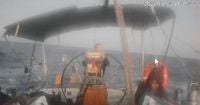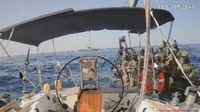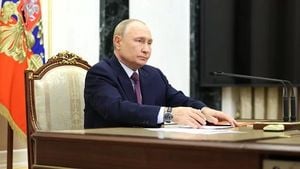On the morning of October 3, 2025, the Mediterranean Sea was the stage for a dramatic confrontation between Israeli naval forces and a humanitarian flotilla determined to breach the blockade of Gaza. The Global Sumud Flotilla, a coalition of 44 vessels carrying hundreds of activists, journalists, and politicians from more than 40 countries, was systematically intercepted by Israeli forces over a tense 38-hour period, culminating in the seizure of the last remaining boat, the Polish-flagged Marinette, approximately 42.5 nautical miles from Gaza’s embattled shore.
The flotilla’s mission was clear: to deliver humanitarian aid and draw international attention to what organizers and supporters describe as the “illegal siege” of Gaza. The activists on board included high-profile figures such as climate activist Greta Thunberg, Nelson Mandela’s grandson Mandla Mandela, former Barcelona mayor Ada Colau, and Member of European Parliament Rima Hassan, according to reports from BBC and Al Jazeera. Their presence lent global visibility to an operation that quickly became a flashpoint for international debate and protest.
“There are very, very real tragedies happening—not just on a mass scale but on an individual scale and families,” said Julio, one of the 150 activists who gathered outside the Consulate General of Israel in Los Angeles on October 2, as reported by ABC7. “People losing loved ones, losing their children, losing their parents.” The demonstration, which temporarily shut down Wilshire Boulevard, was just one of many that erupted worldwide in response to the flotilla’s interception.
From Latin America to Europe and Asia, tens of thousands of protesters poured into streets, railway stations, and city squares, waving Palestinian flags and chanting, “Free Palestine!” In cities such as Barcelona, Geneva, Rome, and Sao Paulo, the rallies swelled into the thousands, sometimes resulting in clashes with police and, in Italy, even a general strike. The Associated Press noted that demonstrators accused Israel of violating humanitarian rights and worsening the crisis in Gaza, while also demanding the immediate release of the detained activists.
The Israeli navy began intercepting the flotilla’s vessels on the night of October 1, 2025, continuing through October 3. Livestreams broadcast the tense moments as Israeli troops boarded boats, including the Marinette, often cutting communications in the process. According to the BBC, the first boats were stopped about 70 nautical miles off the Gaza coast in international waters, with others intercepted closer to shore. The flotilla’s organizers, the Global Sumud Flotilla (GSF), called these actions “illegal” and appealed to governments and international institutions for intervention. “This is an illegal attack on unarmed humanitarians. We call on governments and international institutions to demand their immediate safety and release,” the GSF said in a statement cited by BBC.
Israeli authorities, for their part, argued that the flotilla’s actions constituted a “provocation” and a breach of a lawful naval blockade. The Israeli foreign ministry stated, “Already four Italian citizens have been deported. The rest are in the process of being deported. Israel is keen to end this procedure as quickly as possible.” Officials also emphasized that all 461 detained activists were “safe and in good health,” as reported by Al Jazeera and BBC.
Yet, the flotilla’s supporters and several international observers challenged the legality of Israel’s actions. Stephen Cotton, general secretary of the International Transport Workers’ Federation, representing over 16.5 million workers, told Al Jazeera, “Attacking or seizing nonviolent, humanitarian vessels in international waters is illegal under international law. States cannot pick and choose when to respect international law. The seas must not be turned into a theatre of war.” The United Nations’ special rapporteur for Palestine, Francesca Albanese, went further, describing the interceptions as an “illegal abduction” and expressing solidarity with Gaza’s civilians.
The flotilla’s journey had begun at the end of September 2025, with boats setting sail from Spain, Tunisia, and other Mediterranean ports. The mission’s scale was unprecedented: not only was it the largest attempt yet to breach the blockade, but it also included a diverse roster of participants, from lawmakers to journalists. Reporters Without Borders (RSF) condemned the detention of more than 20 foreign journalists, calling it a “serious violation of the right to inform and be informed.” Martin Roux, head of RSF’s crisis desk, stated, “RSF condemns the illegal arrest of the news professionals who were on board these ships to cover a humanitarian operation of unprecedented scale.”
As the boats neared Gaza, Israel’s navy issued repeated warnings, instructing the vessels to turn back due to the proximity of an “active combat zone.” When these warnings were ignored, the navy acted, boarding and seizing the boats one by one. The Marinette, delayed by engine trouble, was the last to be intercepted. Its Australian captain, identified only as Cameron, told flotilla organizers via video call that they were determined to continue: “We have a bunch of very tough Turks onboard… we’ve got a lady from Oman and myself, and we’re just going to continue in the direction.”
In the aftermath of the interceptions, the fate of the detainees became a central concern. By October 3, four Italian parliamentarians had already been deported back to Rome, and Israel was preparing to deport the remaining activists. According to statements from the International Committee to Break the Siege of Gaza, several detainees began an open-ended hunger strike from the moment of their detention. The GSF alleged that many activists were assaulted with water cannon during the seizures, though Israeli authorities maintained that detainees were unharmed.
The international response was swift and, in some cases, severe. Colombian President Gustavo Petro announced the expulsion of Israeli diplomats and the cancellation of Colombia’s free trade agreement with Israel, as reported by Al Jazeera. European governments—including Germany, France, the United Kingdom, Spain, Greece, and Ireland—called on Israel to respect the rights of those detained and to ensure their safety. The United Nations had not yet issued an official statement by the time of this report, but pressure was mounting from multiple quarters for an independent investigation and the release of the activists.
Meanwhile, the movement to break the Gaza blockade showed no signs of abating. Another flotilla, comprising nine vessels from the Freedom Flotilla Coalition and the Thousand Madleens to Gaza, had already set sail from Italy and was expected to reach the region in the coming days. As Malaysian activist Nadi Al-Nuri, a member of the flotilla’s steering committee, told the Associated Press, “We will do this again and again and until we reach our end. And that is to stop the genocide and to liberate Palestine.”
As the world watches, the events of early October 2025 have reignited debate over the legality and morality of the Gaza blockade, the rights of humanitarian activists, and the responsibilities of states under international law. For now, the fate of the detained activists—and the broader struggle over access to Gaza—remains unresolved, but the global outcry suggests this story is far from over.






